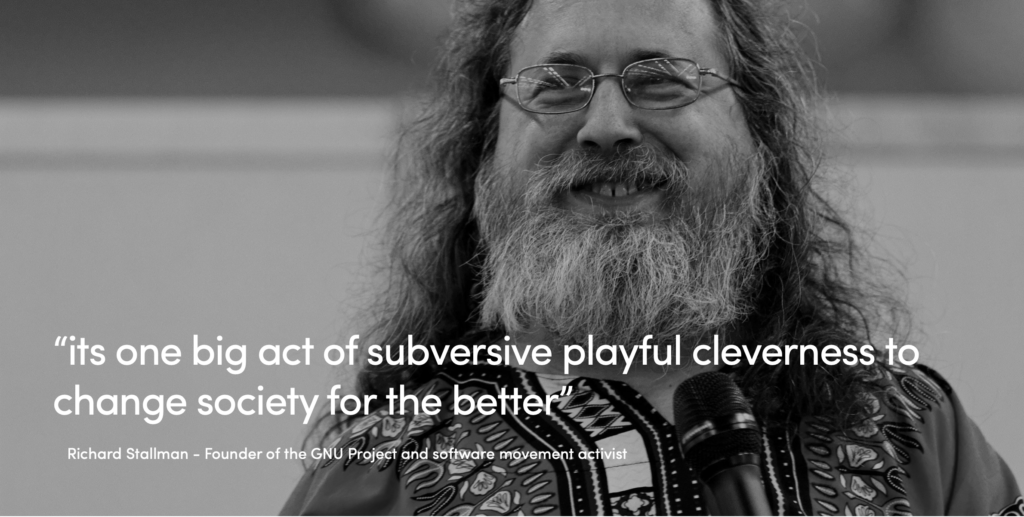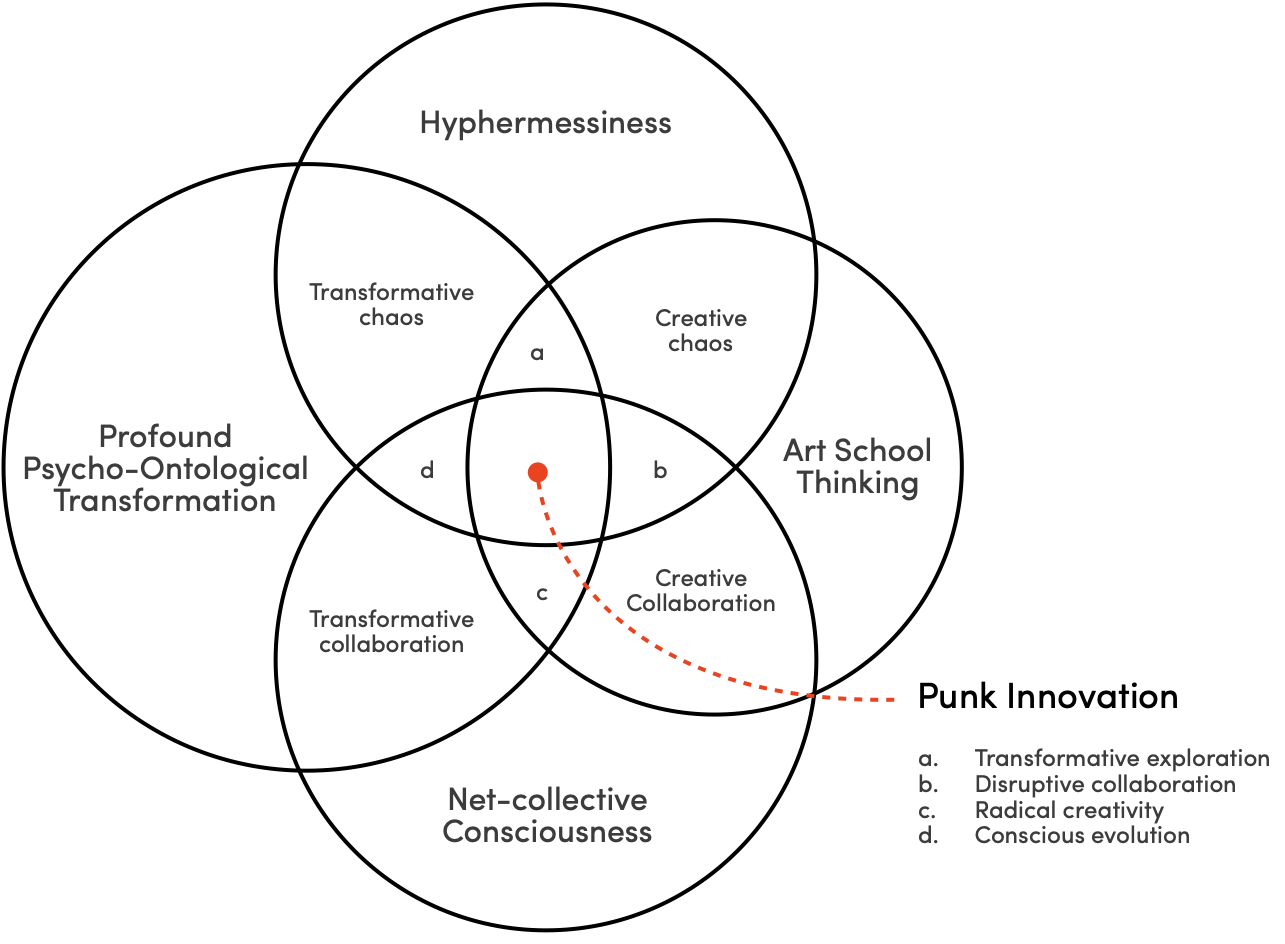Creative exploration and proposed axioms for modes of rebellious invention
Introduction
Innovation is stuck, boring and stifled by the clutches of bureaucracy, corporate agendas, and an incessant, perhaps even perpetual frenzy fuelled by late capitalism. It’s stuck due to a reliance on misguided ideologies propagated by equally stuck educational systems, alongside the unimaginative classes distributing a dwindling supply of resources. Enter the innovation-industrial complex, a loose canon with no clear trajectory, and with no care for where it drops its balls.
Innovation also lacks a big picture. While we might be inclined to pardon the post-war enthusiasm of the boomer generation, with its utopian visions of progress, the thrill of automobile-fuelled freedom on autobahns, and the tantalising promises of oil and new-age plastics, subsequent decades have exposed the unfortunate truth: this exuberance has culminated in a reckless surge of overindulgence and overshoot, an issue that was already articulated as early as 1972 by The Club of Rome’s “The Limits to Growth.”
The unimaginative classes – still mostly either directed by or heavily influenced by the boomer mindset remain entrenched in this haze, immobilised by lame policies and ideologies, transfixed on distorted perceptions of ‘growth,’ much like rabbits caught in the headlights. The prospect of a leap with any meaningful benefit to future life is in every sense, beyond the realm of imagination. Instead, terms such as ‘sustainability’ and ‘social responsibility’ have evolved into placeholders, offering an illusory sense of contentment and simulated virtue.
Hangovers of complacency (no future)
The punk movement emerged in the mid-1970s, as a response to the growing complexity, complacency, conformity, and consumerism that had begun engulfing society. It promoted a DIY ethos, advocating for self-sufficiency, a turning point in self-expression, and a liberation of independent creativity. Disturbingly, even the current state of industrial innovation still reflects the lingering effects of this complacency, and in my view, this is the backpfeifengesicht (a face that is asking for a punch) that the anarchic ingenuity of punk can gladly (metaphorically) take a swing at.

Mothers & forefathers of anarchic energy
Fundamental to the embodied spirit of Punk Innovation is a deep-rooted, hands-on acknowledgement of the complexity of entangled forces and the cacophony of the world. Punks intimately feel the pain and chaos and wrestle with the messiness first-hand. They have no time for conventional thinking and embrace a disruptive, proactive, non-conformist, creative, and expressive approach to exploration. Punk innovation is the necessary mother of invention which has been inherently understood and embodied by the neurology of creatives, rebels, and trouble-makers for centuries, often nourished by backgrounds in art schools.
These principles come alive through the examples of proactive mothers and fathers who have championed the ethos of Punk across history. Sylvia Pankhurst, with her groundbreaking strides in women’s rights, challenged entrenched norms and forged a path towards gender equality. Malcolm McLaren, together with Vivienne Westwood, harnessed the audacious spirit of Punk to ignite a subversive cultural revolution through music and fashion.
Mahatma Gandhi repurposed the power of non-violence, wielding it as a potent tool for societal change against an oppressive establishment. John Lennon & Yoko Ono, leveraged fame, art, and music to craft platforms for peace and provocative thought, cultivating collective consciousness and transformation.
Linus Torvalds, by creating Linux, became an icon of technological innovation, infusing the anti-establishment, DIY ethos into the world of open-source computing, the vital spirit of rebellion central to the free software and ‘hacker’ movement tirelessly innovated by activist Richard Stallman.
Nicolaus Copernicus stood by his provocative ideas about our place in the cosmos, demonstrating the potential of unorthodox perspectives to spark a revolution and enlightening shifts in exploration and ontological understanding.
While you’ll likely struggle to find the conventions of history labelling these figures as punks, they all embraced the imposed and detrimental paradigms of their time, and rebelled against them head-on. Their anarchic energy not only bent history but has also forged immutable legacies of anti-establishment transformation, and arguably serve as guiding ‘can-do’ icons of action for paradigms to come.

Sylvia Pankhurst: Stands as an exemplar of Punk with her groundbreaking work in advancing women’s rights. Through her disruptive approach to challenge established norms and pave the way for gender equality. Malcolm McLaren (With Vivienne Westwood): Maestro of Punk music, fashion, and culture, epitomises the audacious spirit of Punk. He channelled the rebellious energy of the time to spark a subversive movement igniting a cultural revolution. Mahatma Gandhi: Reinvented the principle of non-violence as a potent weapon for social change, embodying the ethos of Punk through his disruptive resistance against the establishment that engulfed him at the time sparking transformative movements. John Lennon & Yoko Ono: Harnessed their fame innovating platforms for peace and provocative thinking through art, music, and activism, fostering modes of collective consciousness and societal change. Linus Torvalds: Creator of Linux, an icon of technological innovation, disrupted conventional norms in the world of computing by challenging the norms of consumerism, an anti-establishment, DIY stance also central to the open-source and ‘hacker’ movement. Nicolaus Copernicus: Challenged the geocentric model, employing a radical mindset for the time, his revolutionary idea demonstrated how embracing unorthodox perspectives can lead to profound shifts in understanding, and enlightenment.
Axioms of Punk Innovation
This article proposes four fundamental axioms or pillars for a bold rethink of how we bring ideas into the world. Through these axioms, the approach of Punk Innovation acknowledges the depth of predicaments, creates, models and invents without the constraints of convention. It comprehends the acute needs of civilisation and conceives modes of transformation without fear or toxic influence. Unafraid to smash assumptions, the themes of these axioms aim to channel energy into riots of proactive creativity, anarchic problem-solving and unbound paradigm shifts.
Axiom 1: Hyphermessiness (the ugly monster)
Hyphermessiness embodies the sum-total of the chaotic forces that envelop and entangle us at any given moment. These forces are characteristically unquantifiable, unpredictable, and incomprehensible, exerting inadvertent effects on the individual. In the 21st century, this phenomenon has grown to monstrous proportions, perpetuated by the infinite layers of information and data that we swim in.
Axiom 2: Art School Thinking (the philosophy)
Art School Thinking is the unique and rebellious philosophy that underpins our deepest modes of exploration and innovation. It has been the tool of some of the most pioneering minds and those that can genuinely envision the profanities of challenges, conjuring and often creating the most unimagined responses along the way.
Axiom 3: Profound Psycho-Ontological Transformation (the vehicle)
The monumental shift and reimagining of one’s understanding of self and reality. It delves into the profound depths of human consciousness and existence, propelling an exploration of uncharted territories. PPOT is orchestrated through transformative experiences that awaken and trigger moments of enlightenment in individuals, stimulate the ‘overview effect’, or ‘necessary distance’.
Axiom 4: Net-collective Consciousness (the minimum requirement)
Not a utopian or fluffy pipe dream, but a fundamental necessity for a balanced existence. This is the notion of global interconnectedness—a weaving of a collective ‘point of reference’ and understanding tangible, embodied and shared values. An intercultural unity that arises from recognising a shared humanity, fuelling a trajectory of harmonious equilibrium.

Methodologies & applications
The convergence of these axioms reveals new methodologies of potential, disruptive, often collaborative by nature, and infinite in application. At the core, anarchic modes of radical creativity are fused in pursuit of a necessary conscious evolution, creating unimagined ground for creative and transformative chaos.
In my work, I carry this as the essential toolbox—void of obsolete hangovers, complacency, unhelpful assumptions, or disingenuous platitudes. I see these as tools which can radically effect change, confronting stagnation head-on, and leveraging the potential of ‘art’ to its transformative and proactive function once again. For example, this is an approach which I deploy through experiential science, developing immersive interventions that aim to reconnect humanity with itself and a sense of shared values.
Conclusion: Unapologetic energy
In these times which seem entangled in knots of convention and complexity, and which are strangling the possibilities of any effective transformation, Punk Innovation offers a clarion call to shake up, rebel, and reshape the landscape of invention. Punk Innovation represents a philosophical leap in creation, embracing messiness for what it is. It has the energy to pioneer new frontiers in the realm of experiential science, striving to create transformative shifts that transcend conventional boundaries and resonate with the core of human existence.
The stoic legacies of those who have pioneered the spirit of Punk—whether they are visionaries like Pankhurst, luminaries like Gandhi, or techies like Torvalds and Stallman—stand as positive proof of the need for rebellious conviction. Their confrontations underscore the seismic potential of unorthodox creative thinking, enabling us to innovate away from the mundane ineffectiveness of the unimaginative, the complacent, and the painfully boring.
Punk is definitely not a nostalgic bygone era of the past—it’s a rallying spirit of future innovation. It embodies a relentless pursuit of the extraordinary, a relentless questioning of the status quo, and a relentless drive to rip away the knotted points of strangulation.
Invention should never be sterile, predictable, or stifled. Instead, it’s about channelling the energy of human intuition, embracing the instinct to create, rebel, and shape a future that is authentically bold and disruptive. A future which is essentially and unapologetically exploratory, celebrating the essence of what it means to be human, and forever pulsing with the positive blood of profound transformation.
This is part 2 of a series of three articles:
- Experiential science: Embracing ancient practices, advanced technologies and the vital emergence of a profound opportunity
- Punk Innovation: Creative exploration and proposed axioms for modes of rebellious invention
- Profound transformation: The case for a different mindset and why creativity holds the key



